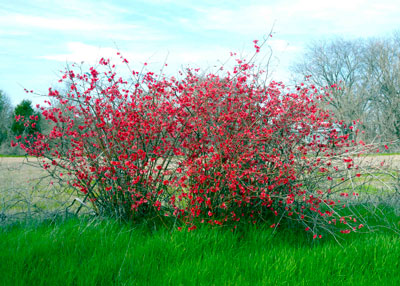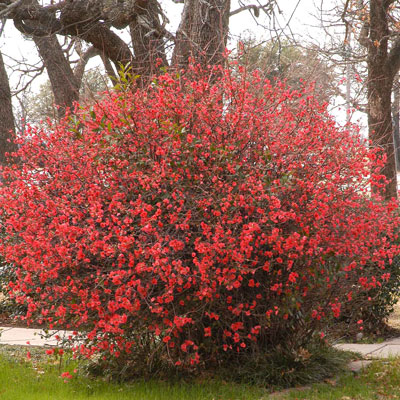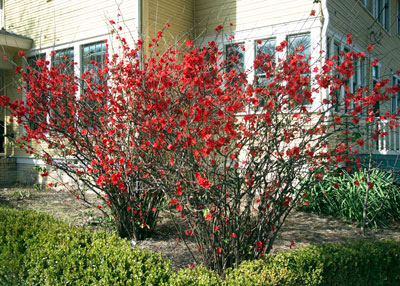Flowering Quince is the First
We Texans have loved this venerable old shrub forever, and when you see them still holding their own and blooming profusely around old, abandoned homesites, it’s easy to see why.

Photo: Flowering quince blooming at an old East Texas homesite years after the house has disappeared.
Our grandmas called them “japonicas,” but that was merely a reference to their country of their origin. Since we have many plants that have come from Japan, it’s probably not a good plan to use that as a common name for any of them – it could get confusing. Botanists used to call them “Cydonias” but more recently they’ve gone by Chaenomeles japonica.
Everyone ought to have at least one flowering quince somewhere strategic. It probably ought to be out back by the fence or way over in the corner. That’s because as pretty as these plants are when they’re blooming, they’re equally unsightly by the middle of summer. You want to plant them in front of dark evergreen foliage where they can pop out when their time to shine arrives late in the winter, then shrink back when they’re done.

Photo: Lovely, full flowering quince blooms in an urban garden. You’ll also see white and pink forms fairly commonly.
Quince flowers come in shades of red, pink, orange and white (also bi-colors), and they look like apple blossoms, only in a much wider assortment of shades. Some are single flowering (one row of petals), while others are double (many clustered petals).
The old-fashioned flowering quince plants grew to be 4 to 6 feet tall and wide. Dwarf varieties have been introduced, but many of us have found them to be less than impressive. We still lean back to the old types that have proven their durability. You’ll find them in nurseries, or you might even be able to locate one sprouting up as a side-shoot from a larger mother plant. It can be dug, separated and replanted while evenings are still very cool.

Photo: An heirloom house is flanked by two heirloom flowering quinces blooming in full profusion. Early spring can’t get any better.
Among the many selections of flowering quince out there in the marketplace, choosing one specific type can become a bit hectic. Your best option will be to get into a local independent retail nursery now, while they have plants in flower, and choose the one that most perfectly calls your name. You’ll be glad that you did.
